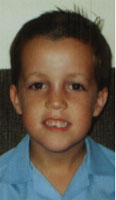Ear Infection Case Study, Mother & Child

Debbie McAndrew, mother of patient with otitis mediaQ1. How many of your children have suffered from acute otitis media (AOM)?
Of my three children, only one of them has suffered from acute otitis media and that's Jake.
Q2. How did you first discover that Jake had AOM and what did you do about it?
We first discovered that Jake had acute otitis media at about age three when we noticed that his hearing had deteriorated. In fact, his pre-school teacher picked it up. We then sought professional helpfrom an ear, nose and throat specialist and we had an audiogram to test his hearing.
Q3. What has been Jake's experience with otitis media (OM)?
Basically Jake gets a build up of fluid behind the eardrum which becomes very gluey - hence it's called "glue ear". And he's had antibiotics to treat his glue ear and also grommets inserted. He's also had a perforated ear drum because there's been so much fluid build up behind his ear.
Q4. How long has Jake been suffering from OM and how many infections has he had?
Jake has been suffering from otitis media for about four years now and over that time he's had about 15 infections.
Q5. While caring for Jake, how would you describe the disruption caused to your paid work or other daily activities and why?
Caring for Jake has been a major disruption to my work. The time needed to take Jake to doctors and specialists, audiologists and speech pathologists has meant that I've had to have a lot of time off work.
Q6. How has Jake's relationship with his family and friends changed since having otitis media?
Having otitis media has changed Jake's relationships with his family and friends somewhat. I find when his hearing's down, he's frustrated easily and he tends to lash out at others a lot more than he used to. Also, other members of the family - his brothers and sisters - do get fed up at times when he's always saying "pardon", "I didn't hear you", "what did you say?", so it has been a problem.
Q7. What are Jake's signs and symptoms of OM?
Often Jake's otitis media will follow a cold, a sniffle or even hay fever. The main symptom that we notice with Jake is a deterioration in his hearing. He doesn't often get fever. He'll sometimes get an ear ache. But because his symptoms can be fairly mild at first, we often don't pick it up until he's had the infection for a few days.
Q8. What are the benefits of nose blowing for a child with OM?
Once the infection goes it's really important for a child to continue blowing his/her nose to help clear the fluid. Also when a cold appears, nose blowing can help stop the development of otitis media.
Impact on language, literacy and emotional development
Q9. How has otitis media affected Jake's language, literacy and emotional development?
Because Jake has suffered recurring bouts of otitis media during the time when children learn - their critical literacy, speech and language development - he has suffered quite a lot. He has struggled at school over the past 18 months. In fact, the school has targeted him for a special reading program to help build his skills in this area. This in turn has affected his confidence at school and his self-esteem and often in the playground he becomes frustrated and he'll lash out at other children as well.
Q10. How has OM affected Jake's behaviour at home and in class?
Because Jake suffers from a hearing impairment when he has otitis media, this has really affected his ability to concentrate at school. He finds it really hard to listen for long periods of time and when he loses concentration, he becomes distracted and sometimes a little disruptive. Also trying to concentrate and listen for extended periods of time makes him very, very tired. So he's exhausted by the end of the day.
Q11. What type of learning problems has Jake experienced since developing OM?
Jake has experienced ongoing problems with his speech and language development, with literacy such as reading skills, writing and spelling since he's been at school.
Q12. In your experience, how aware of Jake's hearing loss have his teachers been and how have they dealt with it?
Jake has been lucky that his class teachers have been well aware of his problems and have put in a number of strategies to help him cope with this disability. For instance, they always seat him at the front of the class. They often repeat or paraphrase instructions for him and most of the time they use visual clues - they'll write things on the blackboard or draw a picture - to help him understand what's been asked of him.
Treatment
Q13. How have you been managing and treating Jake's OM to date?
We have used a number of different strategies to treat Jake's otitis media to date. He has had antibiotic medications on occasions. He had grommets inserted at age four, which are little tubes to drain the fluid out of his ear. And he's had regular audiograms to monitor his hearing.
Q14. How easy or difficult has it been to organise for Jake to take a dose of medication while at school and have his teachers been willing to administer the medication on your behalf?
In my experience, Jake's teachers have been willing to administer the medication. But it is an added pressure for them throughout the day and I know it's difficult for them to always remember to give him the medication at the required time.
Q15. What type of problems, if any, have you encountered when trying to organise for Jake to take a dose during the day at school or playgroup?
I find that there are problems when organising Jake to take medicine at school. It's one more thing for me to organise in the morning to put the medicine in his bag; for him to remember to give it to the teacher; for the teacher to put it into the fridge; and for her to give the dose at the required time and the correct amount. And then again, for Jake to remember to collect his medicine from the staffroom fridge. And in the past he's forgotten it and we've missed doses because of that.
Q16. What has been your experience with giving Jake medication 3 times per day over 5 days?
When giving Jake medication over a five day period with three doses a day, at times I have forgotten to give him the required dose at the required time. And in fact, I've sometimes missed a dose altogether. And sometimes, towards the end of treatment, I've even stopped giving him the medication because his symptoms have disappeared and once again, I've forgotten to give him his medication.
Q17. How interested would you be in your child using a twice-daily amoxycillin antibiotic when he next encounters an ear infection?
I would definitely like to give this medication a try next time Jake needed antibiotics for an ear infection. I think anything that simplifies the procedure for a busy mother is worthwhile. The fact that you only need to give two doses a day really makes it much easier.
Q18. What is your advice to people who have or suspect that their children are suffering from otitis media/hearing loss?
My advice for other parents who have children possibly suffering from otitis media or hearing loss is to definitely seek professional treatment straight away. Apart from the permanent hearing damage that can result from untreated infections, children often get these infections at an age which is critical to their speech and language development.
Jake, 7, patient with recurrent otitis media
Q1. What happens when your ears get blocked?
When my ears get blocked they really hurt and throb and I have some days off school.
Q2. How often do you miss school because of your sore ears?
I sometimes miss one or two days a term with my sore ears.
Q3. What happened to your eardrum last year?
Last year I had a lot of gunk and pus in my eardrum and eventually it burst and I had to have grommets inserted. When there's gunk in my ear, I have to use a little vaccum cleaner to suck it out, and it hurts. After getting the grommets, a lady made ear plugs for me and I had to wear them in the bath and shower and when I swam.
Q4. How often do you get pussy ears?
When it's summer my ears sweat inside and I get a lot of gunk. Also I get glue ear after a cold or sniffle in winter.
Q5. What are some of the hearing problems that you have?
I find it hard to hear what my teacher and friends are saying and I have say "pardon" all the time. I often have to put up my hand to try and get my teacher's attention in class because I can't hear her. When I go to my special reading room with my teacher, I find it very hard to read because of my bad hearing. And when I'm not in class and I'm missing out on the writing and whatever else is going on, I really don't know what to do when I get back there. And when I'm in class, I never hear my teacher's words that well, and when she rubs off the writing on the blackboard, I have to try and guess what was up there and it's really hard.
Q6. How much do you like reading, writing and spelling and do you find it hard to do these things?
Reading is hard for me. But my school has recently put me on a special program and now I like it better. I don't like writing because it's hard to spell words and I can't think of how to express my ideas on paper.
Q7. How much do you enjoy learning and going to school?
Last year I didn't like school much, and learning new things was really hard. This year I enjoy it more because I can read more words and this helps me with my work.
Of my three children, only one of them has suffered from acute otitis media and that's Jake.
Q2. How did you first discover that Jake had AOM and what did you do about it?
We first discovered that Jake had acute otitis media at about age three when we noticed that his hearing had deteriorated. In fact, his pre-school teacher picked it up. We then sought professional helpfrom an ear, nose and throat specialist and we had an audiogram to test his hearing.
Q3. What has been Jake's experience with otitis media (OM)?
Basically Jake gets a build up of fluid behind the eardrum which becomes very gluey - hence it's called "glue ear". And he's had antibiotics to treat his glue ear and also grommets inserted. He's also had a perforated ear drum because there's been so much fluid build up behind his ear.
Q4. How long has Jake been suffering from OM and how many infections has he had?
Jake has been suffering from otitis media for about four years now and over that time he's had about 15 infections.
Q5. While caring for Jake, how would you describe the disruption caused to your paid work or other daily activities and why?
Caring for Jake has been a major disruption to my work. The time needed to take Jake to doctors and specialists, audiologists and speech pathologists has meant that I've had to have a lot of time off work.
Q6. How has Jake's relationship with his family and friends changed since having otitis media?
Having otitis media has changed Jake's relationships with his family and friends somewhat. I find when his hearing's down, he's frustrated easily and he tends to lash out at others a lot more than he used to. Also, other members of the family - his brothers and sisters - do get fed up at times when he's always saying "pardon", "I didn't hear you", "what did you say?", so it has been a problem.
Q7. What are Jake's signs and symptoms of OM?
Often Jake's otitis media will follow a cold, a sniffle or even hay fever. The main symptom that we notice with Jake is a deterioration in his hearing. He doesn't often get fever. He'll sometimes get an ear ache. But because his symptoms can be fairly mild at first, we often don't pick it up until he's had the infection for a few days.
Q8. What are the benefits of nose blowing for a child with OM?
Once the infection goes it's really important for a child to continue blowing his/her nose to help clear the fluid. Also when a cold appears, nose blowing can help stop the development of otitis media.
Impact on language, literacy and emotional development
Q9. How has otitis media affected Jake's language, literacy and emotional development?
Because Jake has suffered recurring bouts of otitis media during the time when children learn - their critical literacy, speech and language development - he has suffered quite a lot. He has struggled at school over the past 18 months. In fact, the school has targeted him for a special reading program to help build his skills in this area. This in turn has affected his confidence at school and his self-esteem and often in the playground he becomes frustrated and he'll lash out at other children as well.
Q10. How has OM affected Jake's behaviour at home and in class?
Because Jake suffers from a hearing impairment when he has otitis media, this has really affected his ability to concentrate at school. He finds it really hard to listen for long periods of time and when he loses concentration, he becomes distracted and sometimes a little disruptive. Also trying to concentrate and listen for extended periods of time makes him very, very tired. So he's exhausted by the end of the day.
Q11. What type of learning problems has Jake experienced since developing OM?
Jake has experienced ongoing problems with his speech and language development, with literacy such as reading skills, writing and spelling since he's been at school.
Q12. In your experience, how aware of Jake's hearing loss have his teachers been and how have they dealt with it?
Jake has been lucky that his class teachers have been well aware of his problems and have put in a number of strategies to help him cope with this disability. For instance, they always seat him at the front of the class. They often repeat or paraphrase instructions for him and most of the time they use visual clues - they'll write things on the blackboard or draw a picture - to help him understand what's been asked of him.
Treatment
Q13. How have you been managing and treating Jake's OM to date?
We have used a number of different strategies to treat Jake's otitis media to date. He has had antibiotic medications on occasions. He had grommets inserted at age four, which are little tubes to drain the fluid out of his ear. And he's had regular audiograms to monitor his hearing.
Q14. How easy or difficult has it been to organise for Jake to take a dose of medication while at school and have his teachers been willing to administer the medication on your behalf?
In my experience, Jake's teachers have been willing to administer the medication. But it is an added pressure for them throughout the day and I know it's difficult for them to always remember to give him the medication at the required time.
Q15. What type of problems, if any, have you encountered when trying to organise for Jake to take a dose during the day at school or playgroup?
I find that there are problems when organising Jake to take medicine at school. It's one more thing for me to organise in the morning to put the medicine in his bag; for him to remember to give it to the teacher; for the teacher to put it into the fridge; and for her to give the dose at the required time and the correct amount. And then again, for Jake to remember to collect his medicine from the staffroom fridge. And in the past he's forgotten it and we've missed doses because of that.
Q16. What has been your experience with giving Jake medication 3 times per day over 5 days?
When giving Jake medication over a five day period with three doses a day, at times I have forgotten to give him the required dose at the required time. And in fact, I've sometimes missed a dose altogether. And sometimes, towards the end of treatment, I've even stopped giving him the medication because his symptoms have disappeared and once again, I've forgotten to give him his medication.
Q17. How interested would you be in your child using a twice-daily amoxycillin antibiotic when he next encounters an ear infection?
I would definitely like to give this medication a try next time Jake needed antibiotics for an ear infection. I think anything that simplifies the procedure for a busy mother is worthwhile. The fact that you only need to give two doses a day really makes it much easier.
Q18. What is your advice to people who have or suspect that their children are suffering from otitis media/hearing loss?
My advice for other parents who have children possibly suffering from otitis media or hearing loss is to definitely seek professional treatment straight away. Apart from the permanent hearing damage that can result from untreated infections, children often get these infections at an age which is critical to their speech and language development.
Jake, 7, patient with recurrent otitis media
Q1. What happens when your ears get blocked?
When my ears get blocked they really hurt and throb and I have some days off school.
Q2. How often do you miss school because of your sore ears?
I sometimes miss one or two days a term with my sore ears.
Q3. What happened to your eardrum last year?
Last year I had a lot of gunk and pus in my eardrum and eventually it burst and I had to have grommets inserted. When there's gunk in my ear, I have to use a little vaccum cleaner to suck it out, and it hurts. After getting the grommets, a lady made ear plugs for me and I had to wear them in the bath and shower and when I swam.
Q4. How often do you get pussy ears?
When it's summer my ears sweat inside and I get a lot of gunk. Also I get glue ear after a cold or sniffle in winter.
Q5. What are some of the hearing problems that you have?
I find it hard to hear what my teacher and friends are saying and I have say "pardon" all the time. I often have to put up my hand to try and get my teacher's attention in class because I can't hear her. When I go to my special reading room with my teacher, I find it very hard to read because of my bad hearing. And when I'm not in class and I'm missing out on the writing and whatever else is going on, I really don't know what to do when I get back there. And when I'm in class, I never hear my teacher's words that well, and when she rubs off the writing on the blackboard, I have to try and guess what was up there and it's really hard.
Q6. How much do you like reading, writing and spelling and do you find it hard to do these things?
Reading is hard for me. But my school has recently put me on a special program and now I like it better. I don't like writing because it's hard to spell words and I can't think of how to express my ideas on paper.
Q7. How much do you enjoy learning and going to school?
Last year I didn't like school much, and learning new things was really hard. This year I enjoy it more because I can read more words and this helps me with my work.
MORE
- How to Conquer Bad Winter Health Habits
- Resident Evil: What Lies Outside'
- 1.5 million for 1.5 million Victorians...
- Be U Not a Bully Forum for Parents and Teens
- New Screening Test Recommended To Help Prevent...
- Vitamin D Mushrooms May Solve Health Dilemma
- Gemma Howorth World-First Solates Class Interview
- Federal Government Clarifies Carer Allowance...
- Fiona Clark Sleep Problems Linked to Bullying...
- Elective Surgery and Emergency Care on Increase
- Emotional Stress Proves to be a Pain in the Back
- CPSA applauds Choice IPL and Laser Regulation...
- Karen Kaye Complementary Medicines Are...
- Danielle Stowasser Pain Relief Interview
- Dr Weng Sam Type 2 Diabetes Medication Interview
- Blood Clots and Stroke Fourth Indicator
- An Unhealthy Mouth can lead to Heart Disease
- Sharing MS Diagnosis Key To Retaining Employment
- CanTeen Counselling Service
- Australia Leads The Way With HPV Vaccination Of...





